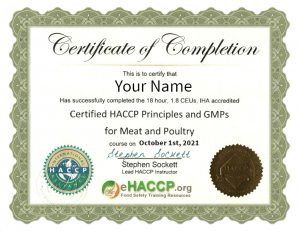Career and Earning Potential with a HACCP Certification
I recently completed the HACCP course and was thoroughly impressed. The curriculum was comprehensive and well-organized, with knowledgeable instructors who provided valuable real-world insights.”
LUNENBURG, NS, CANADA, July 5, 2024 /EINPresswire.com/ -- Having HACCP training and certification opens up several job opportunities primarily in the food industry, where Hazard Analysis and Critical Control Points (HACCP) principles are crucial for ensuring food safety. Here are some common job roles:— Tami Herrera
- HACCP Coordinator/Manager: Responsible for implementing and managing HACCP systems within food production facilities. They ensure compliance with food safety regulations and oversee HACCP plans.
- Quality Assurance (QA) Manager: QA managers ensure that food products meet safety and quality standards, often requiring HACCP knowledge to develop and monitor food safety protocols.
- Food Safety Auditor: Conduct audits of food production facilities to ensure they adhere to HACCP guidelines and other food safety regulations.
- Food Safety Consultant: Provide expertise and guidance to food businesses on implementing and improving HACCP systems.
- Regulatory Affairs Specialist: Ensure that food products comply with regulatory requirements related to food safety, which often involves understanding HACCP principles.
- Production Supervisor/Manager: Oversee production processes in food manufacturing to ensure they align with HACCP standards.
As for the salary of someone with HACCP training and certification, it can vary widely depending on factors such as location, specific job role, industry sector, and level of experience. In the United States, for instance, salaries for roles like Food Safety Managers or QA Managers (roles often requiring HACCP expertise) typically range from $50,000 to $100,000 per year, with higher salaries possible for more senior positions or roles in larger organizations.
It's important to note that while HACCP training and certification are valuable credentials in the food industry, actual salaries can vary significantly based on the specific job responsibilities, the size and location of the employer, and the individual's experience and qualifications.
Being HACCP trained and certified can be rewarding for several reasons:
Career Opportunities: It opens up a range of job opportunities in the food industry, which is vast and constantly growing. Whether you work in food production, quality assurance, regulatory compliance, or consulting, HACCP certification is often a requirement or a highly valued credential.
Professional Development: Obtaining HACCP certification demonstrates a commitment to food safety and quality management. It enhances your professional credibility and can lead to career advancement opportunities.
Impact on Food Safety: Implementing HACCP principles helps prevent foodborne illnesses and ensures the safety of consumers. This aspect of the job can be rewarding as you contribute to public health and safety.
Job Satisfaction: Many professionals find satisfaction in ensuring that the products they work with meet high standards of safety and quality. Knowing that you're playing a role in maintaining these standards can be fulfilling.
Continuous Learning: HACCP principles evolve with new scientific research and regulatory updates. Staying certified requires ongoing education and staying current with industry trends, which can be intellectually stimulating.
However, like any career path, the rewards can vary based on personal goals, job environment, and individual experiences. It's important to consider whether working in the food industry and focusing on food safety aligns with your interests and career aspirations.
Stephen Sockett
eHACCP.org
+1 (866) 488-1410
email us here
Visit us on social media:
Facebook
X
LinkedIn
YouTube
Other
Legal Disclaimer:
EIN Presswire provides this news content "as is" without warranty of any kind. We do not accept any responsibility or liability for the accuracy, content, images, videos, licenses, completeness, legality, or reliability of the information contained in this article. If you have any complaints or copyright issues related to this article, kindly contact the author above.


